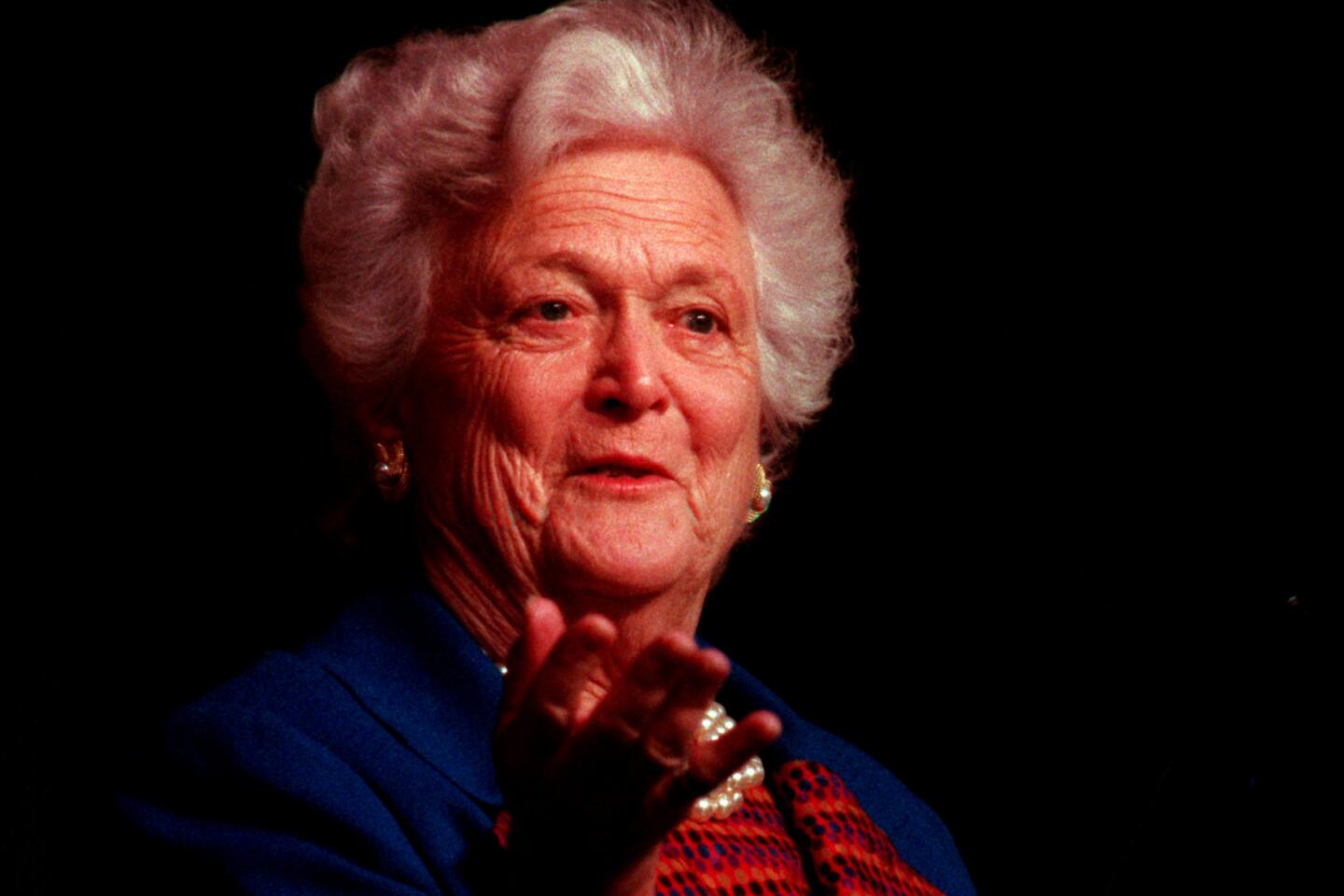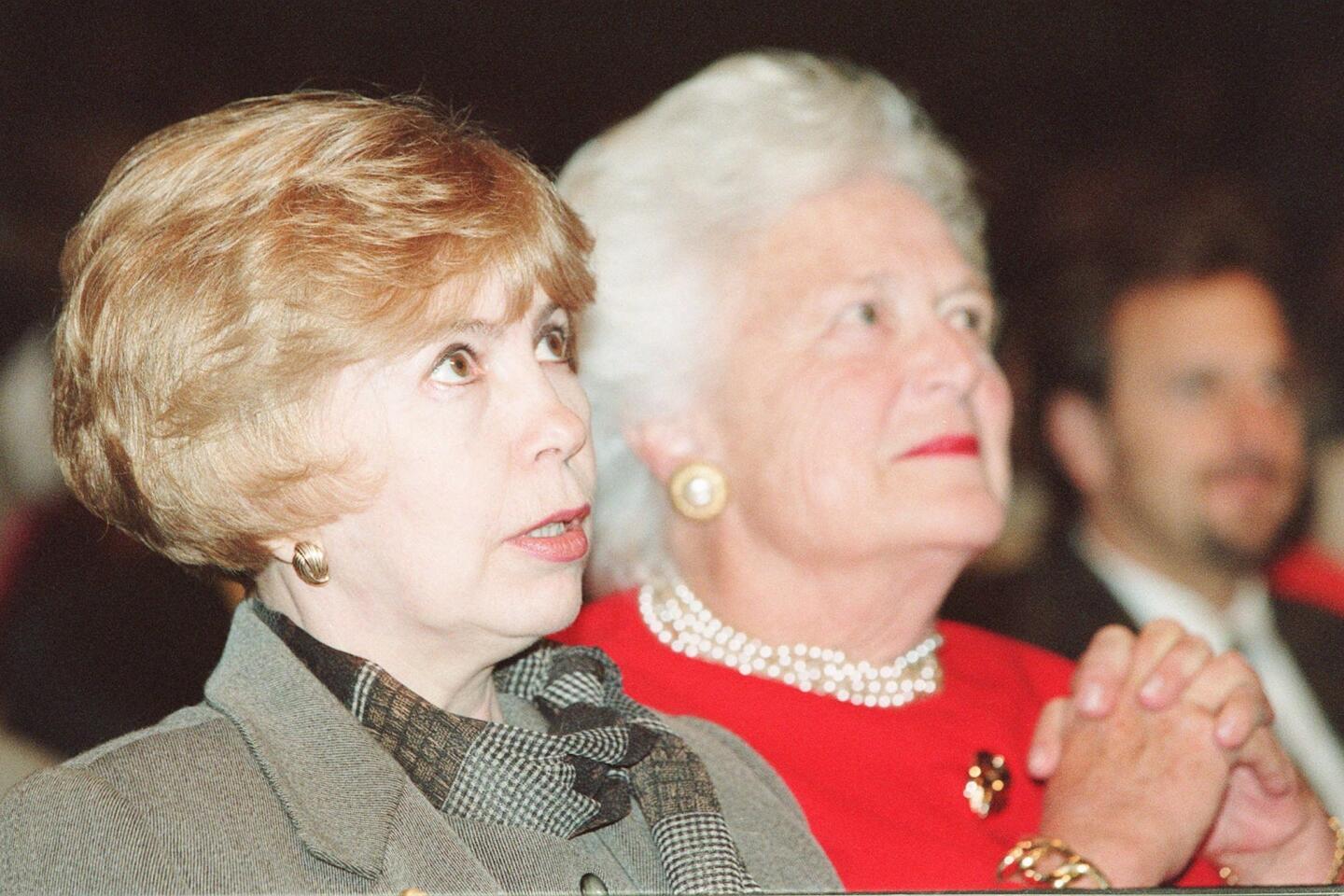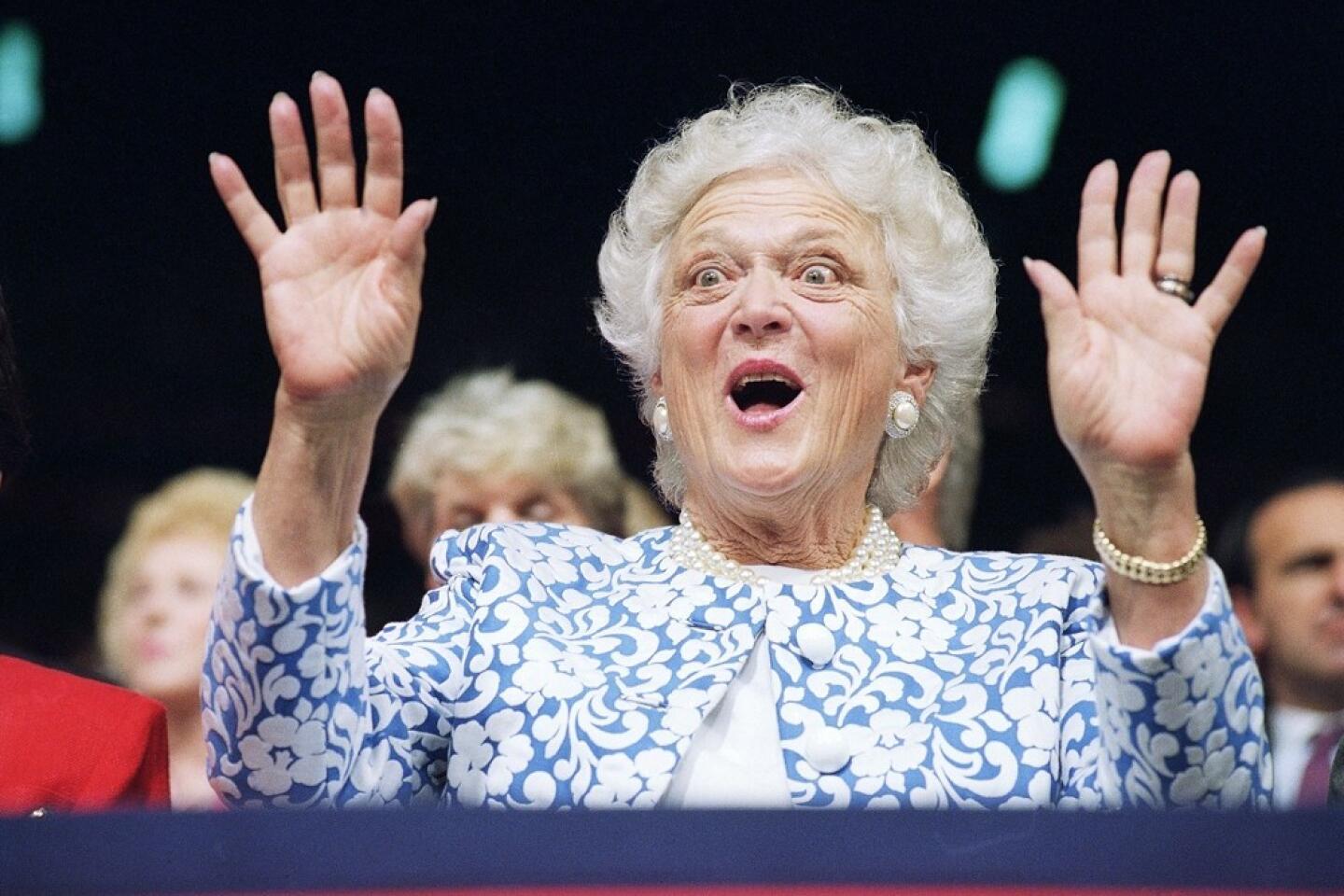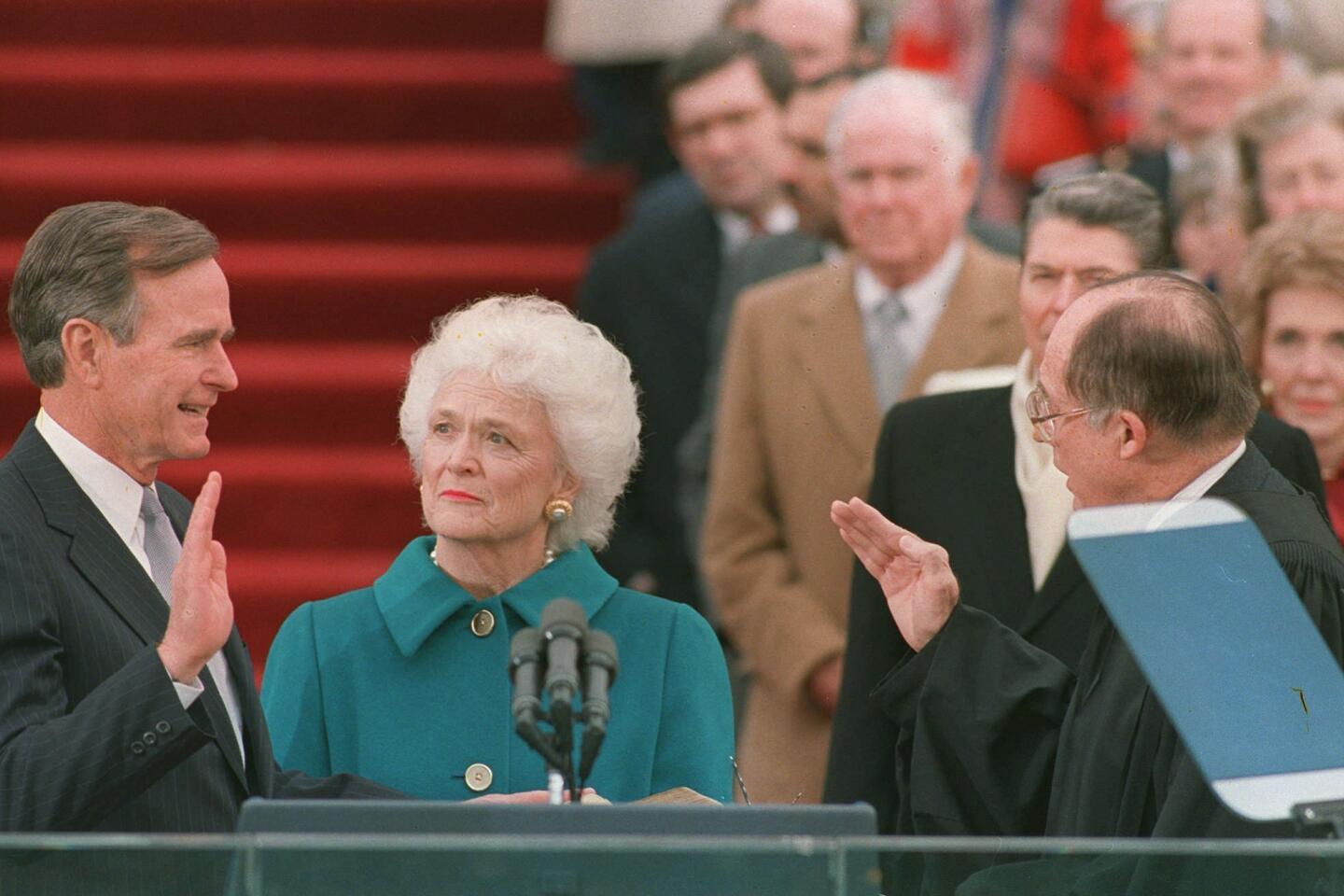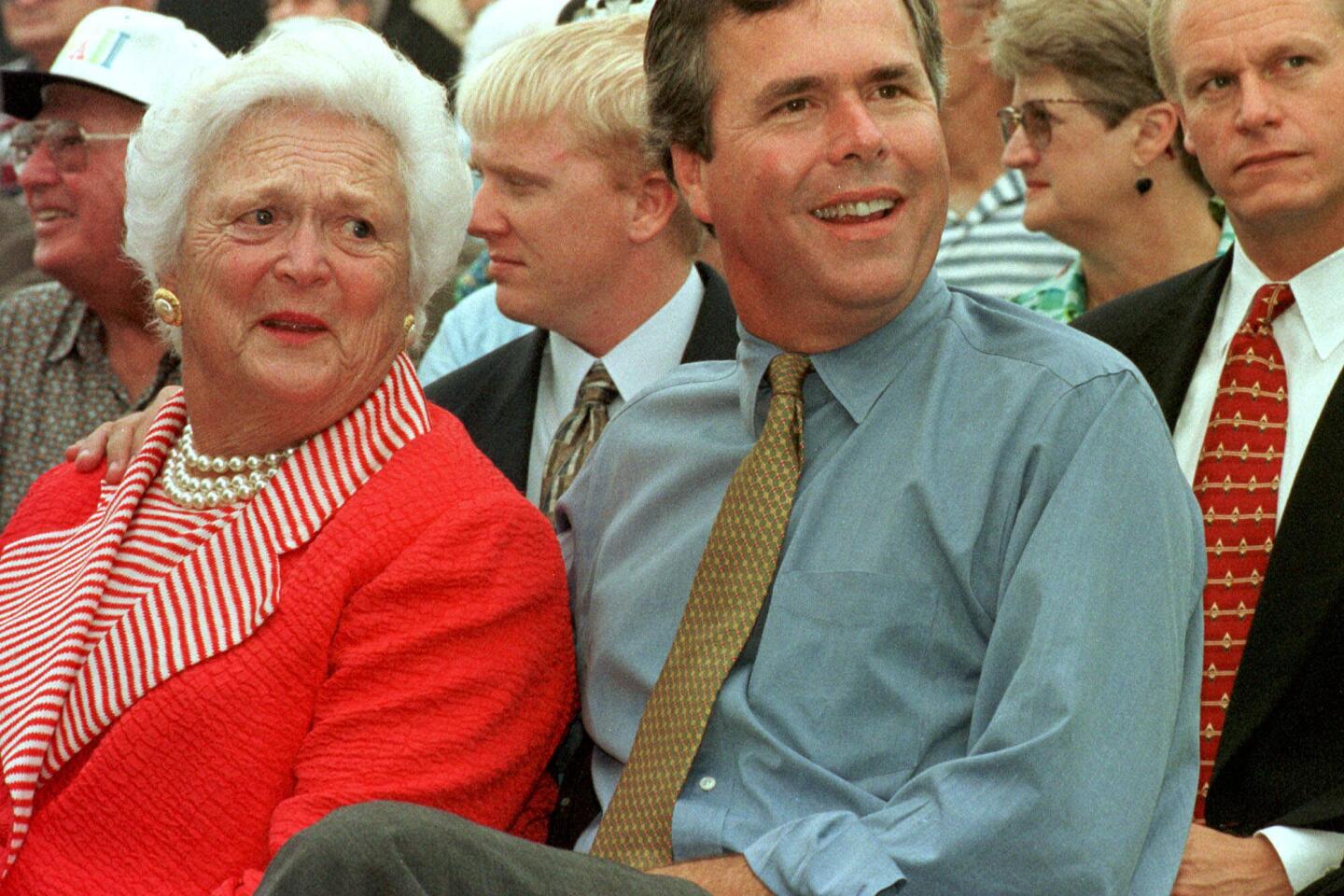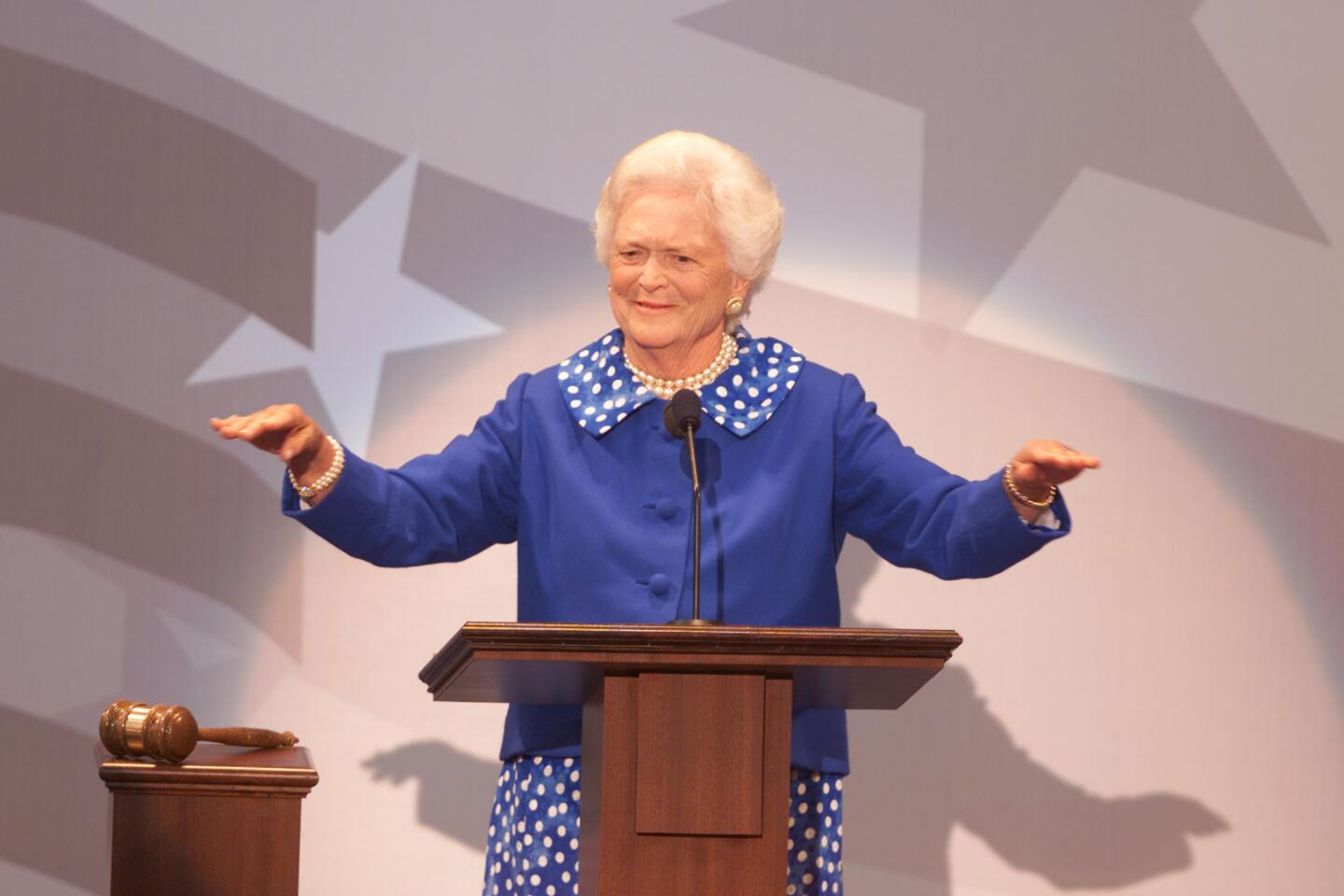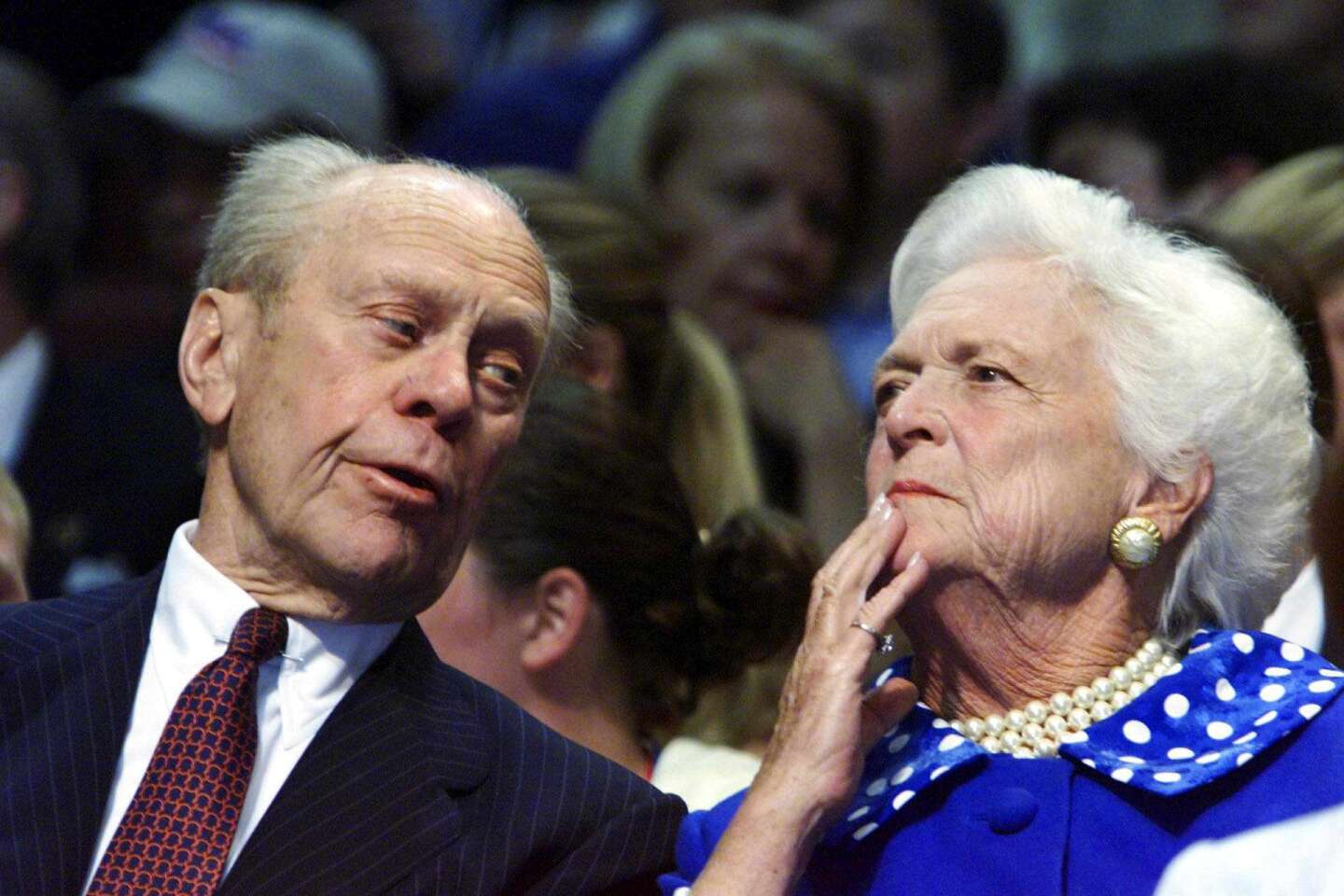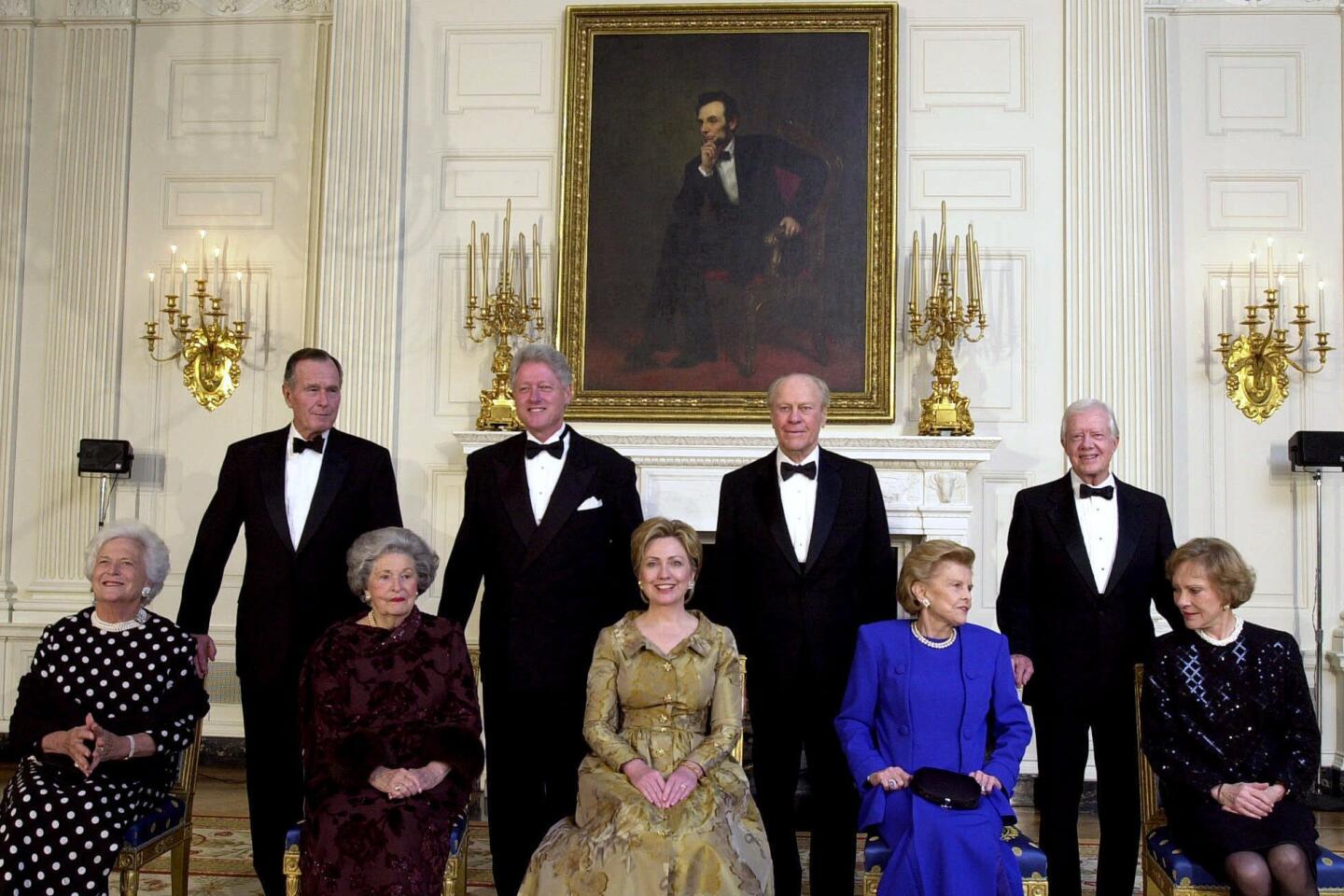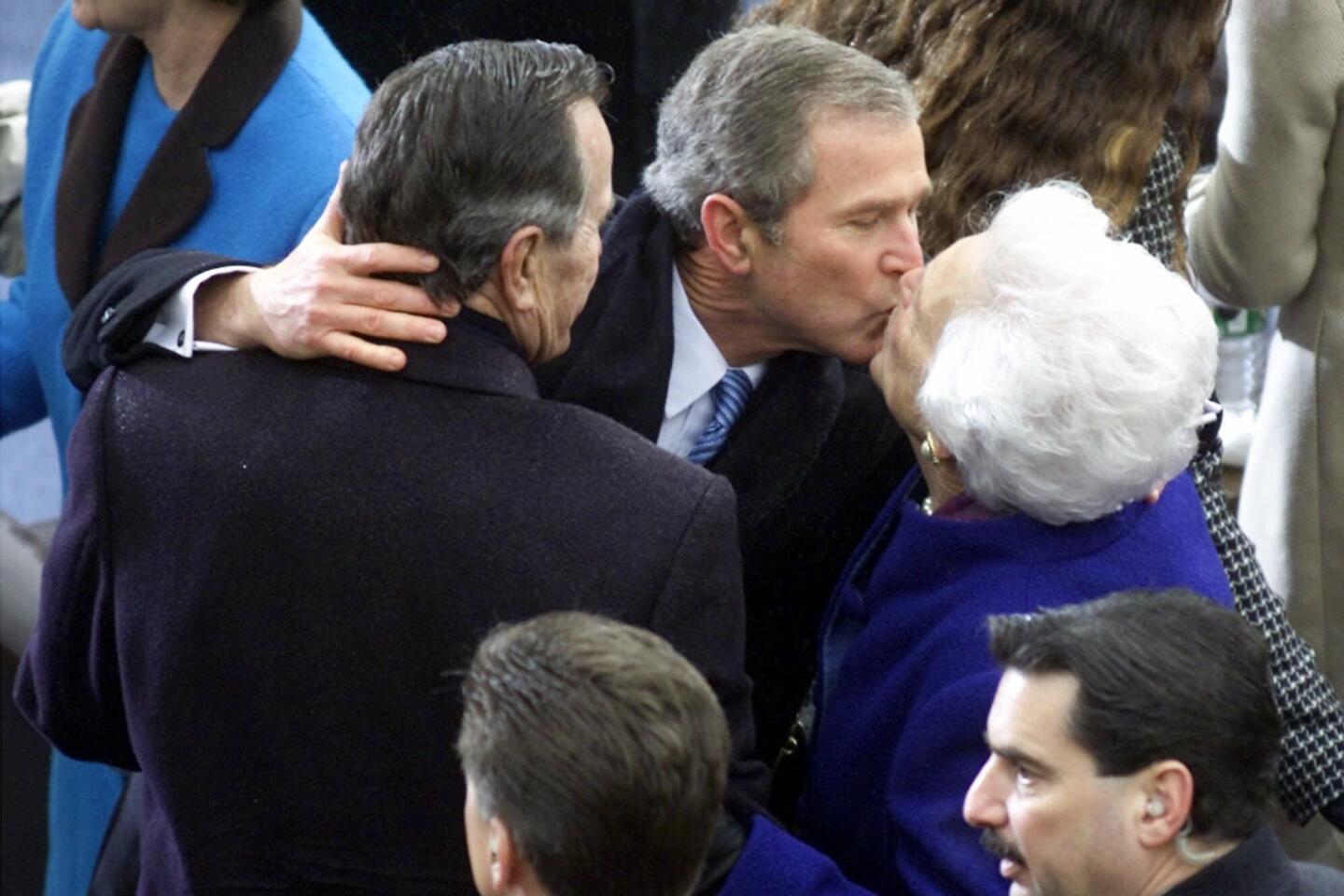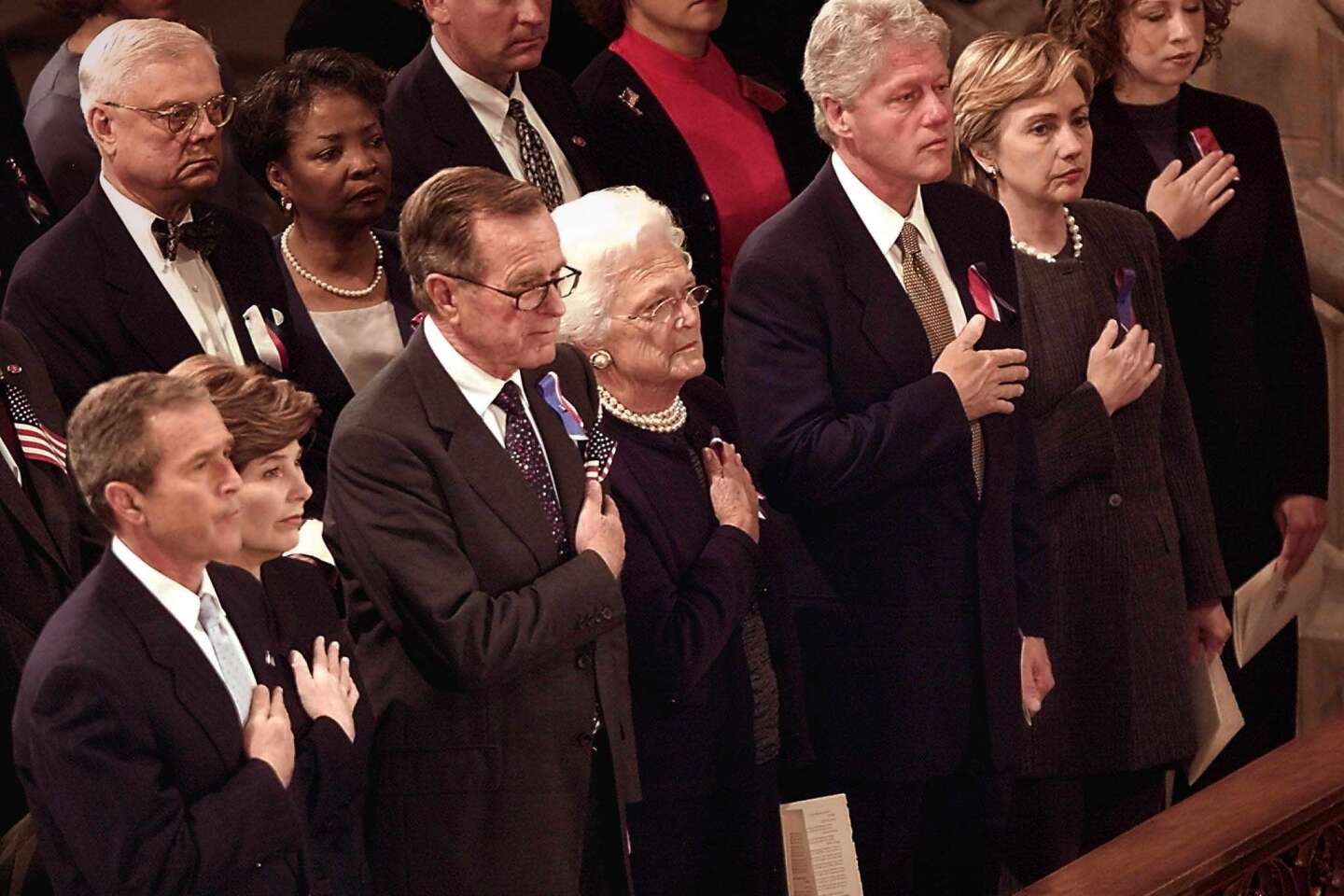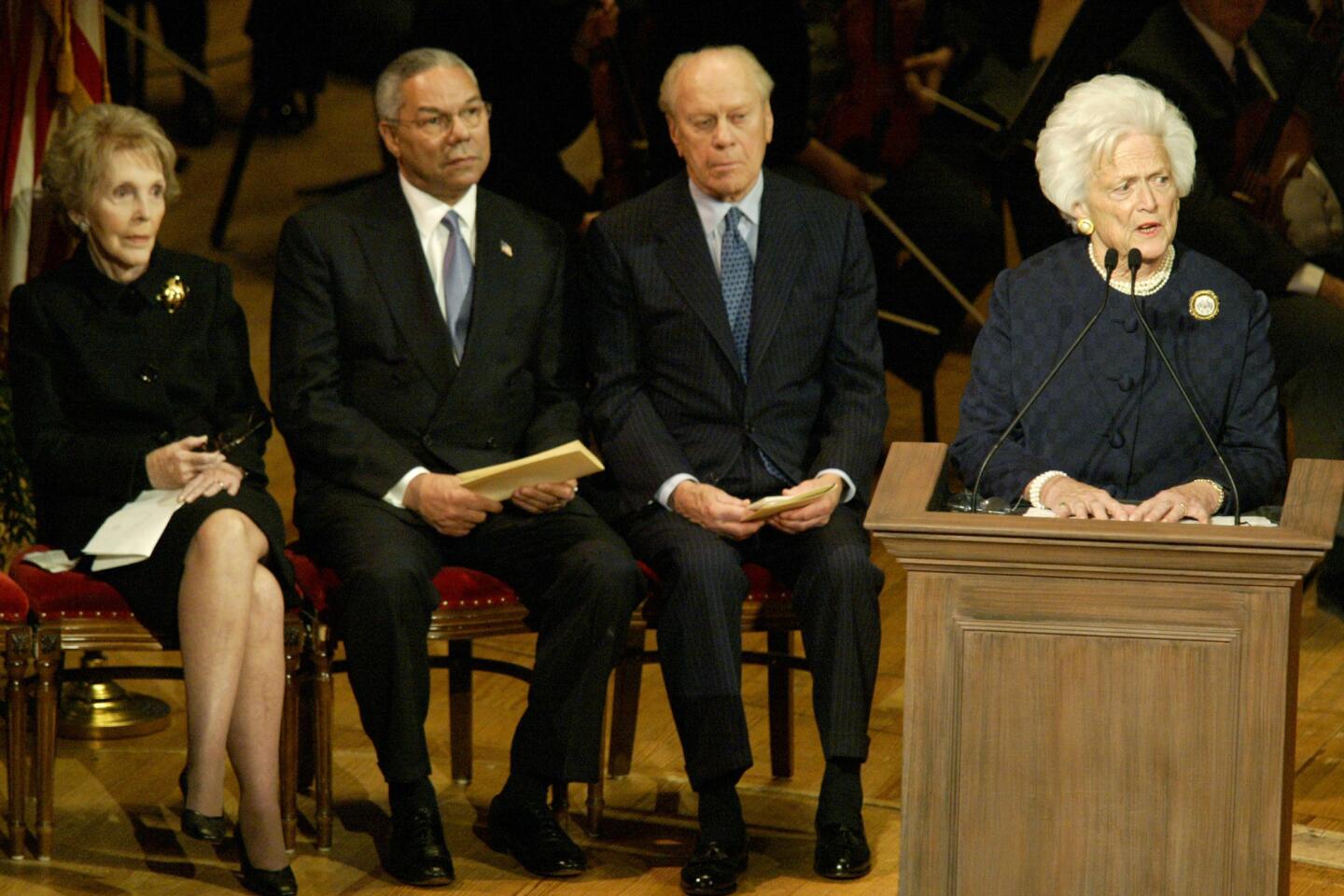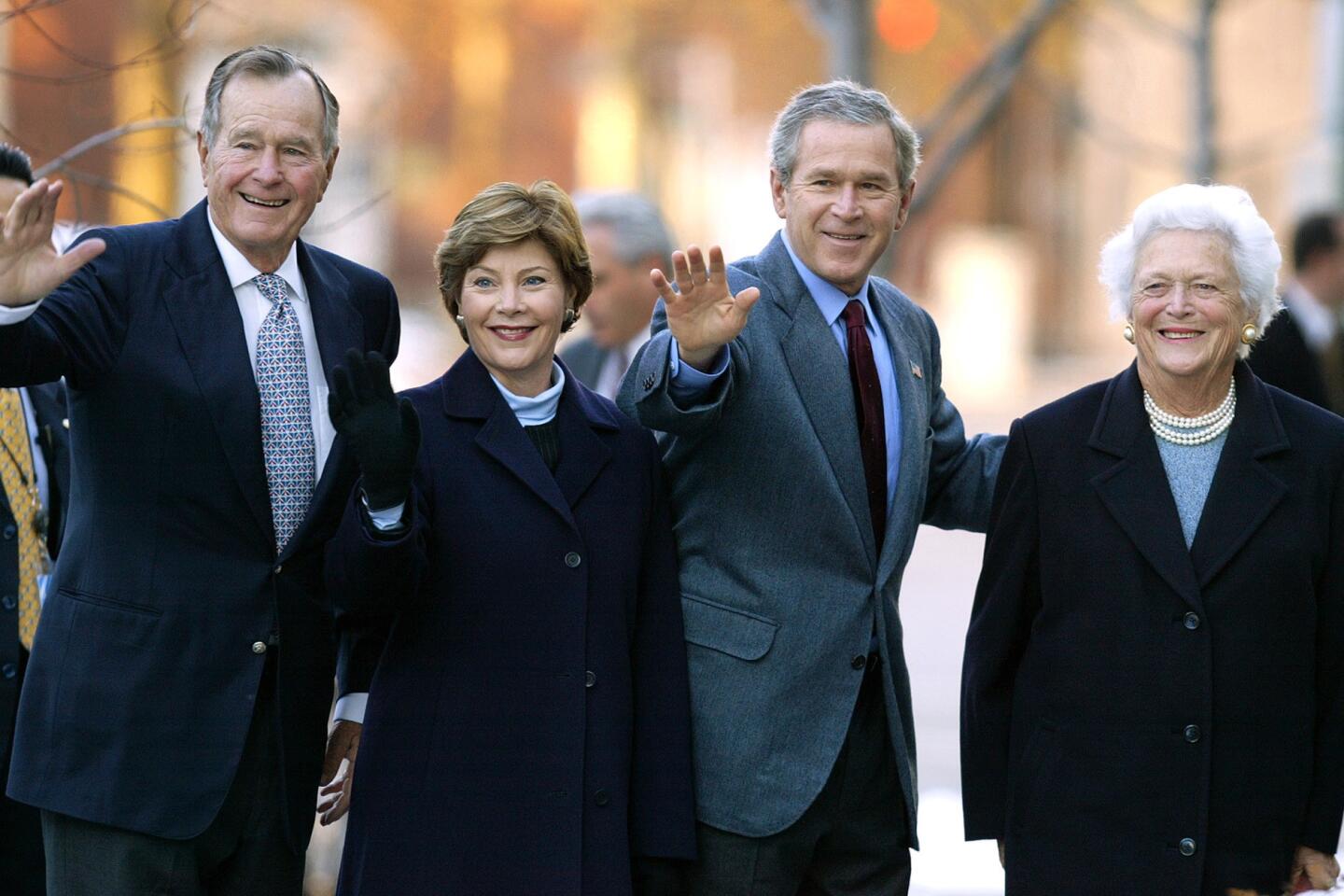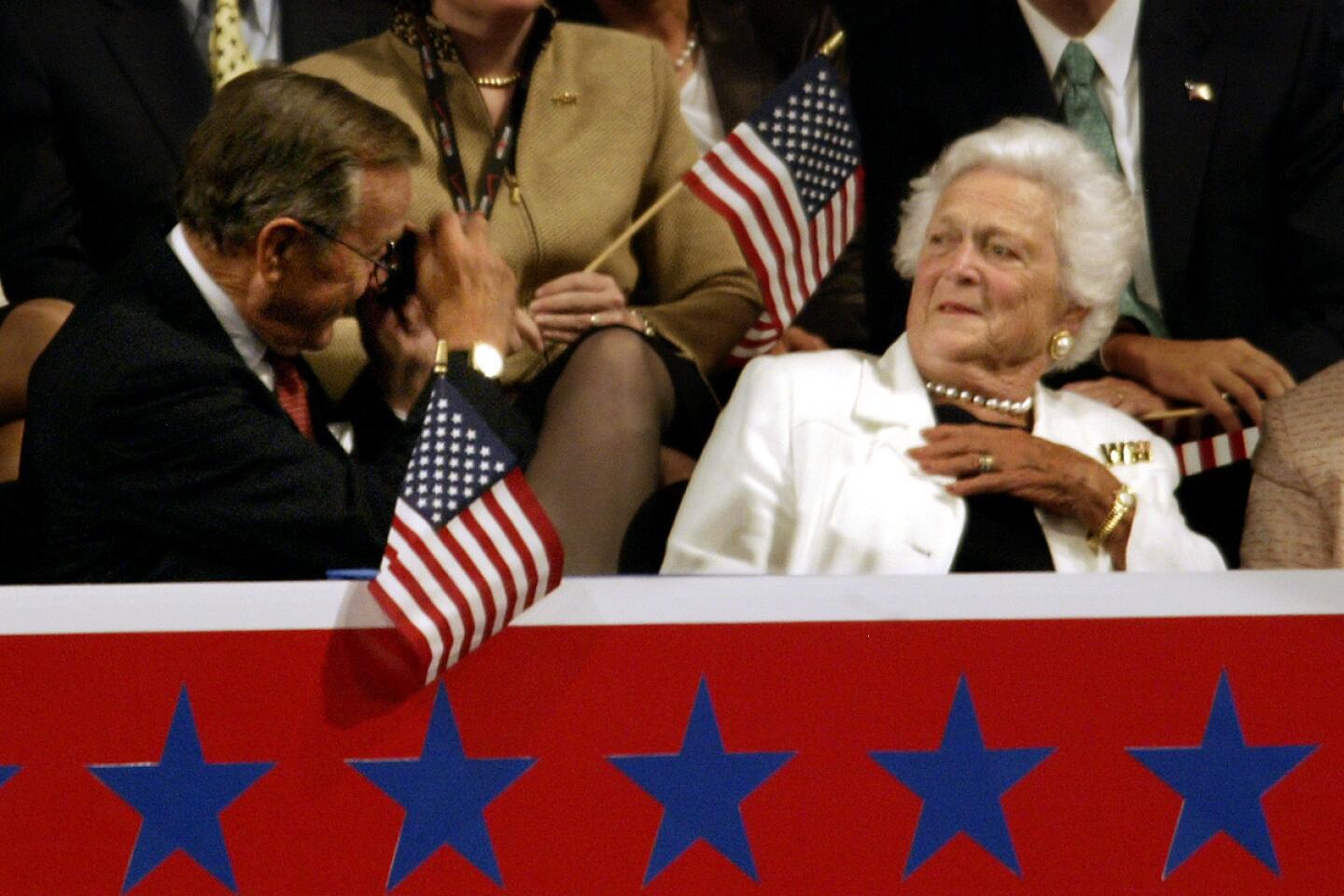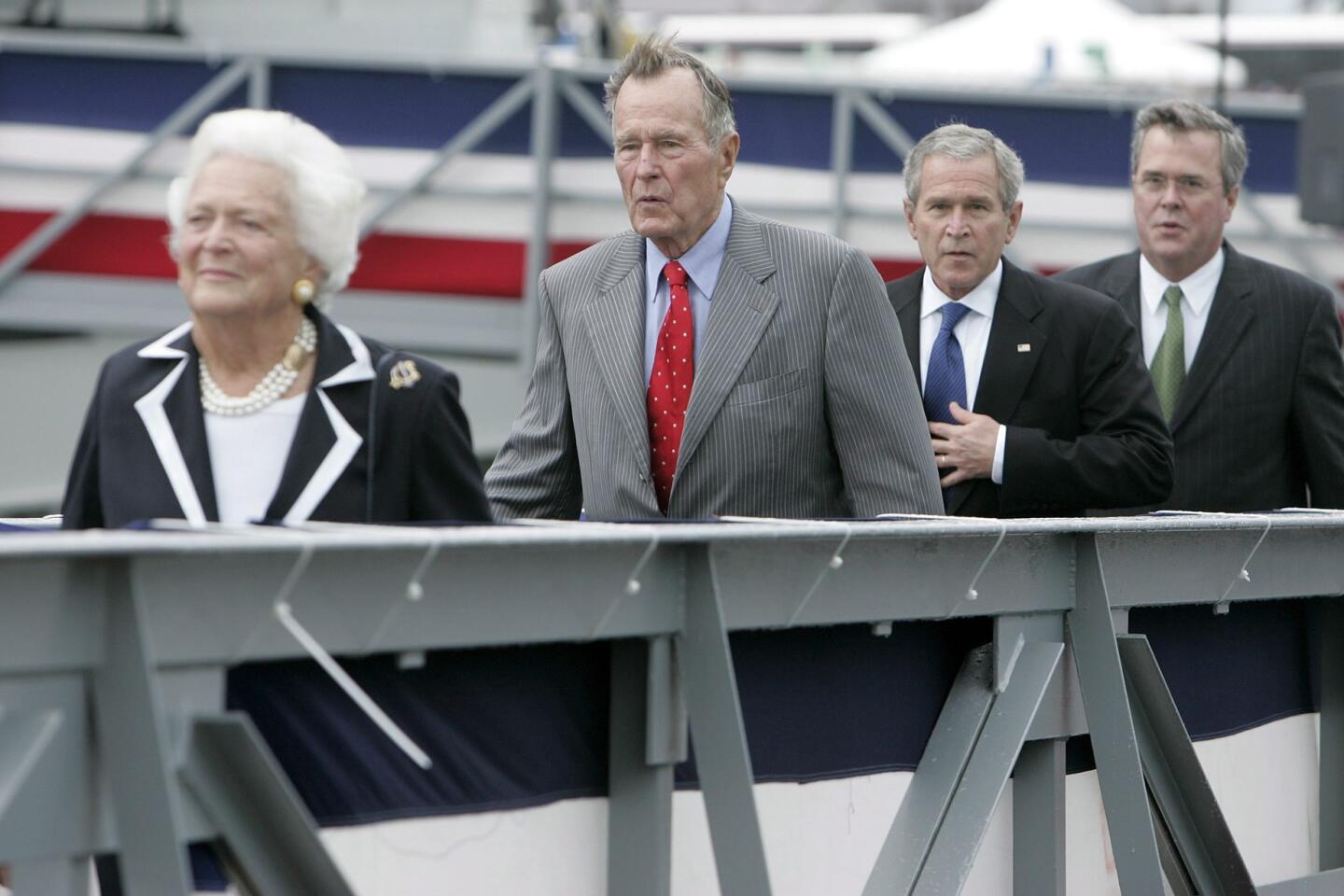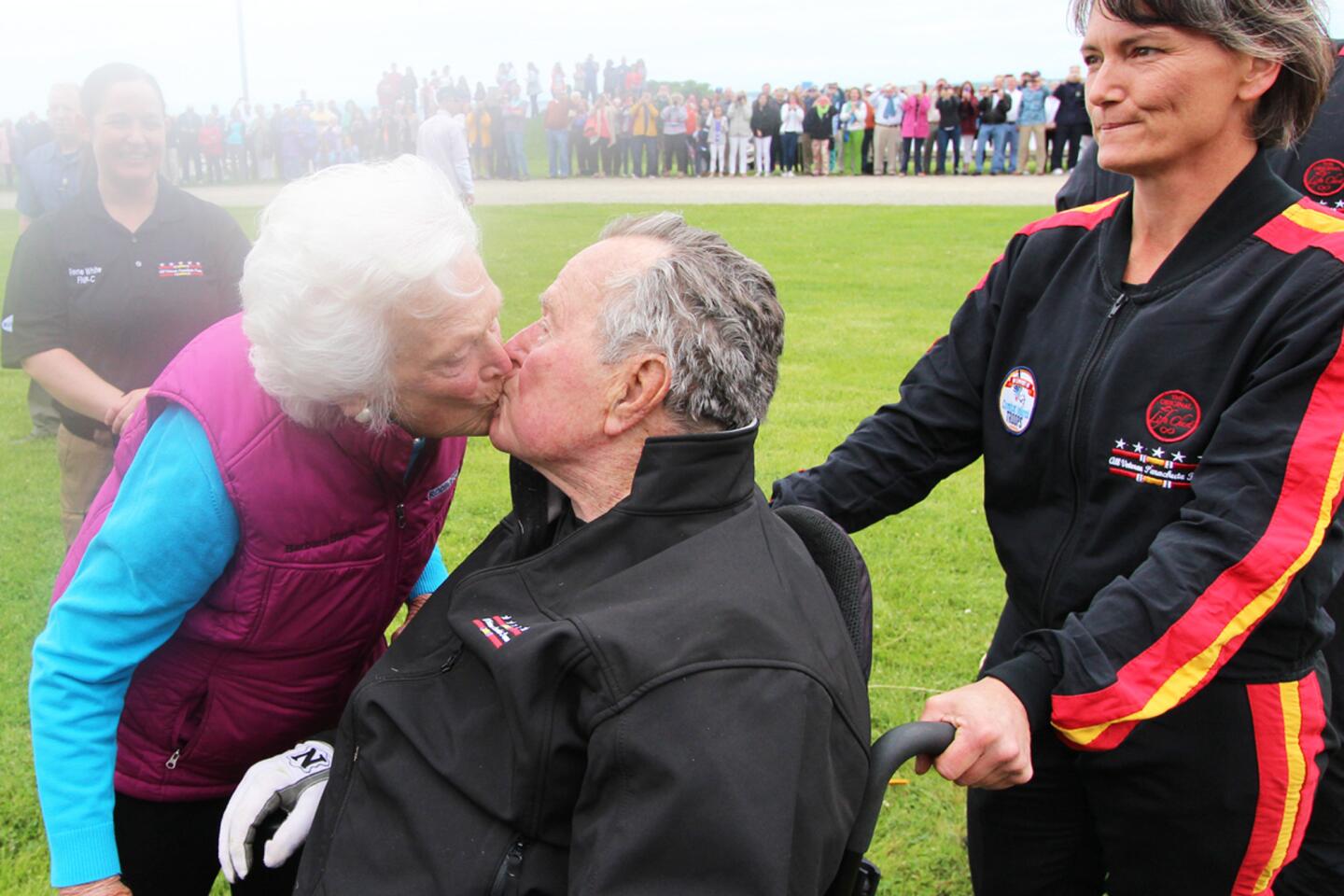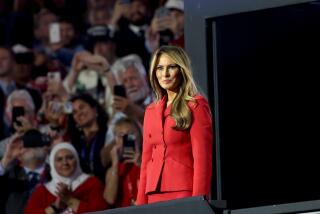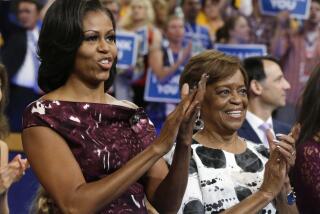Barbara Bush dies at 92; popular first lady was also the mother of a president
- Share via
Barbara Pierce Bush, who helped propel her husband and their son to the presidency and became by virtue of her wit, self-deprecation and work on literacy one of the most popular first ladies in U.S. history, died Tuesday, according to a family spokesman.
Bush, who suffered from heart and respiratory problems, was 92.
On Sunday, the office of her husband of 73 years, President George H.W. Bush, said that following a series of hospitalizations, she had “decided not to seek additional medical treatment and will instead focus on comfort care.”
“It will not surprise those who know her that Barbara Bush has been a rock in the face of her failing health, worrying not for herself — thanks to her abiding faith — but for others,” the statement said. “She is surrounded by a family she adores, and appreciates the many kind messages and, especially, the prayers she is receiving.”
The announcement led to an outpouring of praise from the public and high-ranking officials from across the political spectrum.
Bush is the second woman in U.S. history to have been the wife of one president and the mother of another, George W. Bush. She also campaigned on behalf of another son, former Florida Gov. Jeb Bush, during his unsuccessful quest for the 2016 Republican presidential nomination.
The only other woman to have been the wife and mother of presidents was Abigail Adams, whose husband, John, was the second president, and her son John Quincy Adams was the sixth.
While she was unpretentious, plainspoken and down-to-earth, Bush was also a Northeastern blueblood who was strong-willed, politically shrewd, always blunt and occasionally caustic.
She often downplayed her own considerable skills by saying: “All I ever did was marry and birth well.”
As first lady from 1989 to 1993, she sometimes had a popularity rating that was higher than her husband’s. His presidency may have been imperfect — judged successful in foreign affairs and disappointing on the domestic economic front — but the first lady wielded a behind-the-scenes influence and the skills of an effective campaigner.
Part of her strength was her willingness to poke fun, particularly at herself. Her signature fashion statement was a three-strand choker of unmistakably fake pearls. Her prematurely white hair earned her a teasing family nickname, “the Silver Fox,” even as it inspired unkind gibes about looking like her husband’s mother. (He was born one year before her.)
Frequent photographs of her reading to AIDS babies or underprivileged schoolchildren served to soften a toughness that she acknowledged had come to her late in life, after giving birth to six children, five of whom survive her. To her children and the White House staff, she was “the enforcer” who spoke volumes with a simple raised eyebrow.
During her first year in the White House, she was criticized by Liz Carpenter, former press secretary of another first lady, Lady Bird Johnson, for refusing to speak out on issues that were important to women.
In her 1994 memoir, Bush published a response that she wrote but never mailed: “Long ago I decided in life I had to have priorities. I put my children and husband at the top of my list. That’s a choice that I never regretted.” Abortion rights, the Equal Rights Amendment and gun control were not priorities for her, she wrote. “I leave that for those courageous enough to run for public office.”
Because the two wives who preceded her in the White House — Rosalynn Carter and Nancy Reagan — were frequently accused of wielding too much political influence, the public may have been ready for Bush’s deference to her husband in policy matters.
The nonpartisan social causes she worked for — literacy and volunteerism — stemmed from the tradition of noblesse oblige that was part of her moneyed heritage. Her dedication to philanthropic work was also rooted in personal tragedy.
When her second child, a girl nicknamed Robin, died of leukemia at age 3 in 1953, Bush turned to volunteering as a way to cope with the loss. Literacy also held personal significance because Bush had helped her son Neil overcome dyslexia.
Bush admitted that she shaped her public image to avoid controversy, but occasionally a wicked, sarcastic side broke through.
Her most widely reported gaffe occurred in 1984 during President Reagan’s reelection campaign, when reporters chided her about her husband’s wealth. She responded by calling Democratic vice presidential nominee Geraldine Ferraro “that $4-million — I can’t say it, but it rhymes with rich.” Bush said she thought the comments were off the record; she immediately apologized.
In 2005, when her son’s administration was under fire for its slow response to Hurricane Katrina, she seemed to suggest a silver lining for its victims after touring the Houston Astrodome, which was used as a relocation center for New Orleans residents. “Many of the people in the arena here, you know, were underprivileged anyway, so this is working very well for them,” she said. The administration defended the remark as a “personal observation” based on her conversations with people who were grateful for the help Texas gave them.
When she was first lady, her son George said he considered her “a genius with the media” because she easily joked with reporters, according to a biography by the National First Ladies’ Library. He repeatedly called on his mother for advice while campaigning for and serving in the White House.
Comments about their relationship were a staple of their political speeches, and she often reminded supporters about her son’s headstrong behavior, evident from childhood.
His tenaciousness was “what you want in a president; it’s not what you want in a 6-year-old,” Barbara said during a 2005 appearance with him in Florida.
“Mothers are allowed to be proud of their sons,” she told CNN anchor Larry King in 2003.
Barbara Bush was born on June 8, 1925, in New York City. The third of Marvin and Pauline Pierce’s four children, she enjoyed a privileged upbringing in suburban Rye, N.Y.
Her father was publisher of McCall’s magazine and a distant relative of President Franklin Pierce. She remembered her mother, the daughter of an Ohio Supreme Court justice, as remote.
In 1941, at 16, Barbara met George Bush, then a prep school senior, at a country club dance. She said later that his was the most beautiful face she had ever seen. He was the first boy she kissed; they were engaged a year later, just before George went to war as a Navy fighter pilot. They married on Jan. 6, 1945, while he was home on leave.
After World War II, George Bush enrolled at Yale University, and they had their first child, George Walker Bush, the next year.
As the Bush family grew, they moved from Texas, where Bush worked in the oil business, to five cities in California — Compton, Huntington Park, Bakersfield, Whittier and Ventura — in a single year. After they returned to Texas, he launched his political career in 1966 with a successful run for Congress.
Before George Bush became Ronald Reagan’s vice presidential nominee in 1980, the family had lived in 27 homes in 36 years. The eight years they spent in the vice presidential mansion, from 1981 to 1989, were the longest the couple had lived in one place.
Her husband was absent for long stretches when her children were young, which nurtured her bond with son George, who was seven years older than his next surviving sibling, John Ellis “Jeb” Bush, born in 1953. Sons Neil and Marvin followed in 1955 and 1956, and a daughter, Dorothy, in 1959.
It was while caring for Robin in the eight months before she died that Bush’s hair started going gray. Friends said the Bushes got through their grief by supporting each other. Of that time, Bush told Time magazine in 1989: “George held me tight and wouldn’t let go.”
Battling depression after her daughter died, Bush overheard 7-year-old George telling a friend that he couldn’t come out because he had to play with his mother, who was lonely. She later said that moment made her realize she needed to pull herself together.
Yet as her husband rose in business and politics — through two terms in the House of Representatives, stints as U.N. ambassador and Republican Party chairman — she said she sometimes felt like a neglected homebody.
She had trouble shaking the feeling that George was off “doing these exciting things,” Bush joked to Time, “and I’m sitting home with these absolutely brilliant children who say one thing a week of interest.”
When George was appointed U.S. envoy to China in 1974, she became important to the enterprise and thrived. She called the 14 months in China her “chrysalis.”
After returning to the United States in 1976, her husband became director of the Central Intelligence Agency, and a veil of secrecy isolated her from his work. The growing women’s movement also made her question some of her life choices. By then, only daughter Dorothy was still at home. Barbara slipped into a depression, but brought herself out of it by touring the country with a slide show on China, a country virtually closed to Americans at the time.
“I really love my life, but I could have chosen not to like it,” she told the Los Angeles Times in 1988. “I chose to like it.”
When she was scheduled to speak at Wellesley College’s commencement in 1990, graduating seniors protested that Bush had been chosen because of her husband’s accomplishments. She delivered her speech as planned, and received support from prominent feminists, who saw the issue as one of respect for the different paths open to women.
“At the end of your life,” she said in her speech, “you will never regret not … winning one more verdict, or not closing one more deal. You will regret time not spent with a husband, a friend, a child or a parent.”
After her husband lost his presidential bid for reelection to Bill Clinton in 1992, the Bushes built a home in Houston, and she delighted in being away from politics. She gardened and read voraciously.
Her writings included the best-selling “Millie’s Book” (1990), told from the perspective of her English springer spaniel; it raised more than $1 million for the Barbara Bush Foundation for Family Literacy, which has awarded millions in grants. It followed her 1984 book, “C. Fred’s Story,” a wry look at Washington life in the voice of the family’s cocker spaniel.
During summers, the Bushes hosted the “grands,” as she called her 17 grandchildren, at the sprawling family compound in Kennebunkport, Maine, that could sleep 34. Poking fun at her strict rules, the grandchildren called it “boot camp.”
Repeatedly asked the secret to her long marriage, Bush often replied that a sense of humor was important. Sixty years after their wedding, she described her husband as “that 80-year-old whirlwind who makes my life sing.”
Being the mother of a president did have one distinct drawback compared with being the president’s wife, she said in 2008. The criticism and campaign attacks that go with the territory “hurt much more if your son’s president.”
She continued to offer sharp opinions, such as when she was asked in 2013 whether son Jeb should make a run for the Oval Office. “We’ve had enough Bushes,” she said.
But she nonetheless was at his side when he jumped into the 2016 presidential contest. Traversing snow-battered New Hampshire with the aid of a walker, she greeted Republicans and implored them to make Jeb the third Bush to serve as president. The eventual primary winner, Donald Trump, mocked her son as “poor, poor, poor” Jeb, dependent on his mother.
She also campaigned in South Carolina, a state whose primary Trump also won, prompting Jeb Bush to drop out of the race.
Her view of the man who would become president, and whose success marked the end of Republican politics as practiced by her family, was evident during a CBS interview shortly before the New Hampshire contest. She dismissed Trump for misogynistic comments he made about then-Fox News host Megyn Kelly.
“I don’t know how women can vote for someone who said what he said about Megyn Kelly,” Bush said.
She added a criticism of Trump that spoke of her family’s view of public service: “Money doesn’t buy everything. It’s accomplishments and what you’re doing and giving. It’s incomprehensible to me.”
In 2013, during an interview with CSPAN for a series on first ladies, Bush looked ahead to the circumstances that would close her remarkable life.
“I have no fear of death,” she said, then joked: “Which is a huge comfort, because we’re getting darn close!”
Funeral plans were not immediately released, but Barbara Bush had said she planned to be buried at her husband’s presidential library in College Station, Texas. The couple’s daughter Robin already is buried there.
Bush is also survived by seven great-grandchildren and her brother Scott Pierce.
Nelson is a former Times staff writer. Former Times staff writer Mimi Avins contributed to this report.
UPDATES:
7:20 p.m.: This article was updated with burial plans.
5:10 p.m.: This article was updated with additional information on survivors.
This article was originally published at 4:40 p.m.
More to Read
Start your day right
Sign up for Essential California for the L.A. Times biggest news, features and recommendations in your inbox six days a week.
You may occasionally receive promotional content from the Los Angeles Times.
